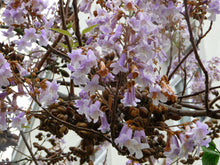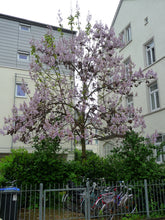Scarification: none required.
Stratification: none required.
Germination: requires light for germination, surface sow and keep moist, tamp the soil, cover seedbed with some shade.
Can grow 10' in a year; brittle wood; flowers pale violet with dark spots and yellow stripes inside, very much resemble foxgloves; flower buds often killed during winter in cold areas; prefers deep moist soil but tolerates many sorts; full sun or part shade, protect from wind; has naturalized throughout much of the East.
Paulownia tomentosa, commonly called royal paulownia, empress tree or princess tree, is native to China. It is a fast-growing, deciduous tree that is primarily grown for its profuse spring bloom of foxglove-like flowers and its large catalpa-like green leaves. It was first introduced into the United States in the mid 1800s, and has since escaped cultivation and naturalized in many areas of the eastern U.S. It is an upright to spreading deciduous tree that typically grows to 40’ tall with a rounded crown. It is noted for its profuse bloom of fragrant, tubular, funnel-shaped, pinkish-lavender flowers (to 2” long) with interior dark purple spotting and creamy yellow striping. Flowers appear in spring in clusters (to 14” long) before the foliage. Flower aroma is reminiscent of vanilla. Flowers are edible and are sometimes added to salads. Flowers are followed by oval, woody, dehiscent seed capsules that emerge sticky green and ripen to brown in fall, at which point they split open releasing abundant winged seeds. Ovate, green leaves (to 5-12” long) are lightly hairy above and densely hairy beneath. No fall color. Paulownia is currently placed in its own family. Wood is commercially valuable in Japan.
Genus name honors Princess Anna Paulowna (1795-1865), daughter of Czar Paul I of Russia.
Specific epithet from Latin means having soft woolly hairs.
Problems
No serious insect or disease problems. Flower buds may be killed by harsh winters.
Garden Uses
Beautiful specimen flowering tree for lawns and gardens. Has also been used effectively in poor soils in surface stripmine reclamation areas.



